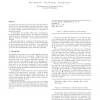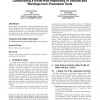327 search results - page 52 / 66 » Semantics for Evidence-Based Argumentation |
ICFP
1999
ACM
14 years 2 days ago
1999
ACM
Programs are often structured around the idea that different pieces of code comprise distinct principals, each with a view of its environment. Typical examples include the module...
SMA
1997
ACM
13 years 12 months ago
1997
ACM
This paper is concerned with frequency adverbs in Japanese. Many linguists have pointed out that frequency statements and generic sentences have multiple readings when they co-occ...
ATAL
2003
Springer
13 years 11 months ago
2003
Springer
What distinguishes e-commerce from ordinary commerce? What distinguishes it from distributed computation? In this paper we propose a performative theory of e-commerce, drawing on ...
DOCENG
2008
ACM
13 years 9 months ago
2008
ACM
In this paper, we show how a domain dependent know-how textual database of advices and warnings can be constructed from procedural texts. We show how arguments of type warnings an...
ACL
1993
13 years 9 months ago
1993
This paper presents a new model of anaphoric processing that utilizes the establishment of coherence relations between clauses in a discourse. We survey data that comprises a curr...


